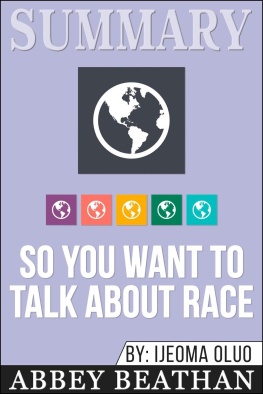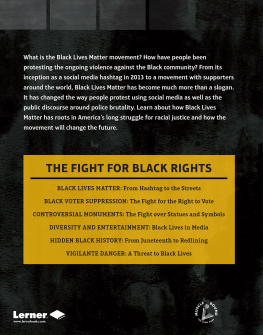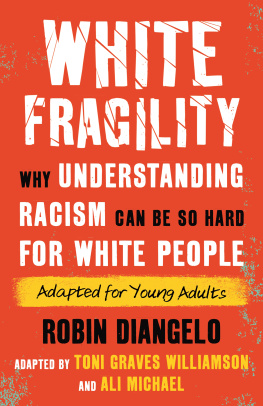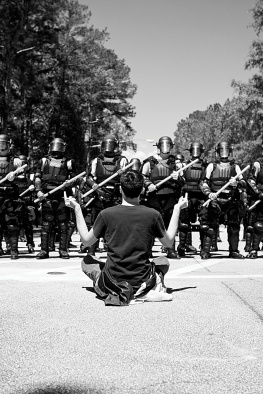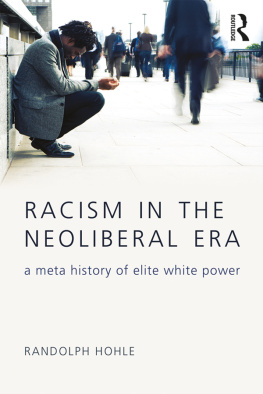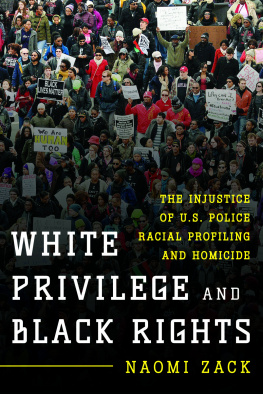Copyright 2018 Ijeoma Oluo
Hachette Book Group supports the right to free expression and the value of copyright. The purpose of copyright is to encourage writers and artists to produce the creative works that enrich our culture.
The scanning, uploading, and distribution of this book without permission is a theft of the authors intellectual property. If you would like permission to use material from the book (other than for review purposes), please contact permissions@hbgusa.com. Thank you for your support of the authors rights.
Seal Press
Hachette Book Group
1290 Avenue of the Americas, New York, NY 10104
sealpress.com
@SealPress
First Edition: January 2018
Published by Seal Press, an imprint of Perseus Books, LLC, a subsidiary of Hachette Book Group, Inc.The Seal Press name and logo is a trademark of the Hachette Book Group.
The Hachette Speakers Bureau provides a wide range of authors for speaking events. To find out more, go to www.hachettespeakersbureau.com or call (866) 376-6591.
The publisher is not responsible for websites (or their content) that are not owned by the publisher.
Library of Congress Cataloging-in-Publication Data
Names: Oluo, Ijeoma, author.
Title: So you want to talk about race / Ijeoma Oluo.
Description: First edition. | New York, NY: Seal Press, 2018.
Identifiers: LCCN 2017041919 (print) | LCCN 2017043938 (ebook) | ISBN 9781580056786 (e-book) | ISBN 9781580056779 (hardback) Subjects: LCSH: United StatesRace relations. | Intercultural communication. | BISAC: SOCIAL SCIENCE / Ethnic Studies / African American Studies. | SOCIAL SCIENCE / Black Studies (Global). | POLITICAL SCIENCE / Political Freedom & Security / Civil Rights.
Classification: LCC E184.A1 (ebook) | LCC E184.A1 O454 2018 (print) | DDC
305.800973dc23
LC record available at https://lccn.loc.gov/2017041919ISBNs: 978-1-58005-677-9 (hardcover), 978-1-58005-678-6 (e-book)
E3-20171124-JV-NF
A S A BLACK WOMAN, RACE HAS ALWAYS BEEN A PROMINENT part of my life. I have never been able to escape the fact that I am a black woman in a white supremacist country. My blackness is woven into how I dress each morning, what bars I feel comfortable going to, what music I enjoy, what neighborhoods I hang out in. The realities of race have not always been welcome in my life, but they have always been there. When I was a young child it was the constant questions of why I was so dark while my mom was so whitewas I adopted? Where did I come from? When I became older it was the clothes not cut for my shape and the snide comments about my hair and lips and the teen idols that would never ever find a girl like me beautiful. Then it was the clerks who would follow me around stores and the jobs that were hiring until I walked in the door and then they were not. And it was the bosses who told me that I was too loud, the complaints that my hair was too ethnic for the office, and why, even though I was a valued employee, I was making so much less money than other white employees doing the same job. It is the cops I cant make eye contact with, the Ubers that abandon their pickup, driving on instead of stopping when they see me. When I had my sons, it was the assumptions that they were older than they were, and that their roughhousing was too violent. It was the tears they came home with when a classmate had repeated an ignorant comment of their parents.
But race has also been countless hours spent marveling at our history. Evenings spent dancing and cheering to jazz and rap and R&B. Cookouts with ribs and potato salad and sweet potato pie. It has been hands of women braiding my hair. It has been reading the magic of the words of Toni Morrison, Maya Angelou, and Alice Walker and knowing that they are written for you. It has been parties filled with Jollof rice and fufu and Nigerian women wearing sequin-covered gowns and giant geles on their heads. It has been the nod to the black stranger walking by that says, I see you fam. It has been pride in Malcolm, Martin, Rosa, and Angela. It has been a room full of the most uninhibited laughter youve ever heard. It has been the touch of my young son as he lays his hand over mine and says Were the same brown.
Race, my race, has been one of the most defining forces in my life. But it is not something I always talked about, certainly not the way that I do now.
Like many people, most of my days were spent just trying to get by. Life is busy and hard. There are work and kids and chores and friends. We spend a lot of time bouncing from one mini-crisis to the next. Yes, my days were just as full of microaggressions, of the pain and oppression of racism, as they are nowbut I just had to keep going on like normal. It is very hard to survive as a woman of color in this world, and I remember saying once that if I stopped to feel, really feel, the pain of the racism I encountered, I would start screaming and I would never ever stop.
So I did what most of us do, I tried to make the best of it. I worked 50 percent harder than my white coworkers, I stayed late every day. I dressed like every day was a job interview. I was overpolite to white people I encountered in public. I bent over backwards to prove that I was not angry, that I was not a threat. I laughed off racist jokes as if I didnt feel the sting. I told myself that it would all be worth it one day, that being a successful black woman was revolution enough.
But as I got older, as the successes I had reached for slowly became a reality, something inside me began to shift. I would try to make my voice quieter in meetings and I couldnt. I would try to laugh off the racist jokes and I couldnt. I would try to accept my bosss reasons for why I could have my promotion but not my raise, and I couldnt. And I started talking.
I started to question, I started to resist, I started to demand. I wanted to know why it was considered a bad thing that I was opinionated, I wanted to know what exactly it was about my hair that was unprofessional, I wanted to know what exactly it was about that joke that people found funny. And once I started talking, I couldnt stop.
I also started writing. I shifted my food blog into a me blog, and started saying all the things that everybody around me had always said were too negative, too abrasive, and too confrontational. I started writing down my frustrations and my heartbreak. I started writing about my fears for my community and my family. I had started to see myself, and once you start to see yourself, you cannot pretend anymore.
It did not go over well. My white friends (having grown up in Seattle, the majority of my friends were white), some of whom Id known since high school, were not happy with the real me. This was not the deal they had struck. Yes, they would rage over global warming and yell about Republican shenanigans, but they would not say a word about the racial oppression and brutality facing people of color in this country. It is not my place, theyd explain when in frustration Id beg for some comment, I dont really feel comfortable. And as I looked around my town and saw that my neighbors were not really my neighbors, as I saw that my friends no longer considered me fun, I began to yell even louder. Somebody had to hear me. Somebody had to care. I could not be alone.
Like dialysis, the old went out and in came the new. Suddenly, people I had never met were reaching out locally and from all across the country in person and online, just to let me know that they had read my blog post and in reading it, they felt heard. Then online publishers started reaching out to me, asking if they could republish my work. And locally, isolated and invisible people of color started reaching out, showing me that I did have neighbors after all.


